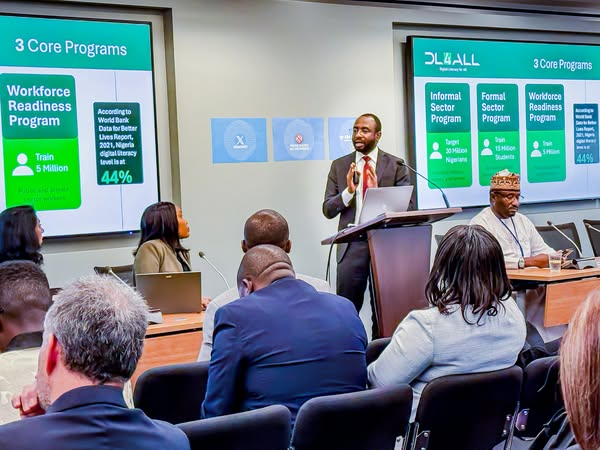
Reported by: Agande Richard Aondofa | Edited by: Henry Owen
Nigeria’s leading technology visionary and Director General of the National Information Technology Development Agency (NITDA), Kashifu Inuwa, CCIE, has once again projected Nigeria’s digital future onto the global stage. Speaking in Washington D.C. during the 2025 Annual Meetings of the World Bank Group and the International Monetary Fund (IMF), Inuwa presented an insightful perspective on how the integration of renewable energy and digital innovation can reshape the nation’s economy, empower communities, and drive inclusive growth.
Inuwa described renewable energy not as an end goal but as a powerful catalyst for change. “When there is power, connectivity follows, and that connectivity triggers true transformation,” he told participants, drawing a direct link between sustainable power and national development. He emphasized that the real transformation of rural Nigeria depends not only on energy access but on the digital tools that accompany it — tools that can enhance productivity, empower small businesses, and connect even the most remote communities to the global economy.
He explained how the convergence of clean energy and technology is redefining livelihoods across Nigeria. From AI-powered agriculture that boosts productivity and reduces waste, to online platforms enabling women entrepreneurs to expand their markets, and digital remote jobs giving young Nigerians opportunities to earn in dollars while living locally — these innovations, he noted, form the foundation of a resilient and inclusive digital economy.
Tying his presentation to President Bola Ahmed Tinubu’s Renewed Hope Agenda, Inuwa reaffirmed that Nigeria’s digital transformation strategy, under the Federal Ministry of Communications, Innovation, and Digital Economy, is rooted in building a future where knowledge, infrastructure, innovation, entrepreneurship, and trade are seamlessly interwoven. He further explained that NITDA has expanded on this vision through its own eight strategic pillars, which are focused on enhancing national productivity, driving innovation ecosystems, and strengthening policy frameworks that promote sustainable digital inclusion.
He disclosed that the Agency, in collaboration with the Federal Ministry of Education, has embarked on an ambitious program to integrate digital literacy into Nigeria’s educational curriculum—from kindergarten through tertiary level—with a bold target of achieving 70 percent digital literacy by 2027. This, he said, will ensure that future generations of Nigerians are equipped not only with the ability to use technology but to create it.
Observers at the global forum commended Inuwa’s presentation as one of the most forward-looking roadmaps for development emerging from Africa, particularly as nations continue to navigate the twin challenges of energy access and digital inequality. His message resonated deeply against the backdrop of Nigeria’s ongoing economic hardship, as he underscored that innovation and technology—when properly harnessed—remain the most sustainable escape routes from poverty.
Inuwa’s speech in Washington D.C. served as both a call to action and a reaffirmation that the future of Nigeria’s growth lies in the hands of its people, powered by clean energy, digital literacy, and visionary leadership that connects innovation with real human needs.
📩 Stone Reporter News
🌍 stonereportersnews.com ✉️ info@stonereportersnews.com
📘 Facebook: Stone Reports 🐦 X (Twitter): @StoneReportNew
📸 Instagram: @stonereportersnews


Add comment
Comments